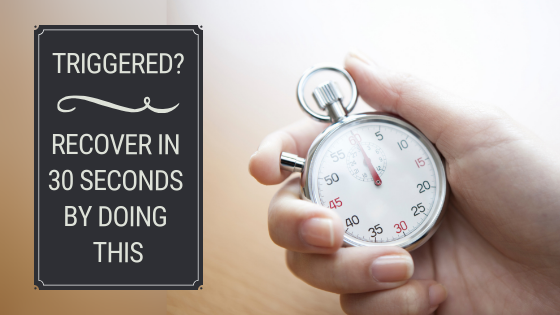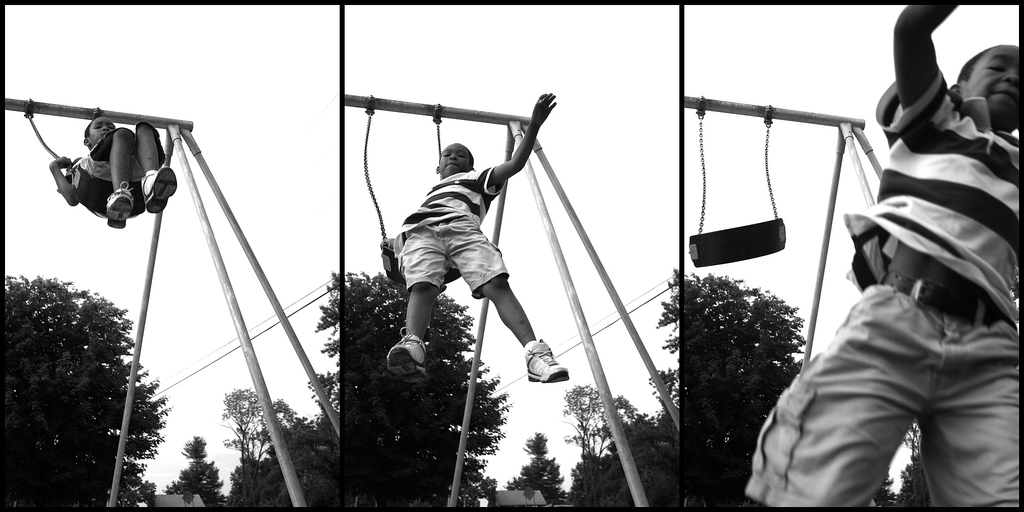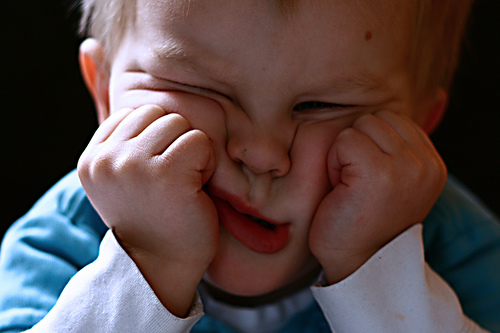If you’re like me, when you’re in a “good place” you just don’t get triggered easily.
As humans, if we’re not stressed or tired, things just don’t bother us that much.
You can probably tolerate just about anything when you’ve had a full night of sleep, eaten, and you’re not worried (about the kids, your partner, work, home, future, money, the environment, politics, or being an “adult”).
BUT how often does that happen?!
Not often…
For most of us parents, we’re dealing with stress each day.
And if we’re stressed then even “little” things can cause us to get triggered, like if…
The kids are slow to get in the car
A family member or boss is upset
A negative comment about us on social media
Your child spills something
Your child says, “No!”
Being asked to do “too much” at work or at home
Your child doesn’t want to eat or sleep
So what is the solution?
I’d like to share with you 4 quick things that turn triggers around.
The best part about these steps is that you can do them in 30-seconds (and you can even teach them to your kids).
Recognize that you are triggered
This step might sound like a “duh! of course” but it’s actually sometimes kind of tough to do. It’s not always easy for me to have enough self-awareness to realize that I’m triggered. Usually other people around me notice before I do!
If you want to “hack” this first step, do what I learned from my friend Michelle Gale, ask your family for help. Tell your family, “I’m trying to notice when I get upset. So if you think I’m upset, can you just remind me to ‘Breathe’? Thanks!” Sometimes even kids as young as 3 and 4 year olds can do this for us.
Pause and breathe
Again, I know it sounds obvious to breathe. We’re breathing all the time, right?! However, when we get stressed we hold our breath, and you might not even realize you haven’t been breathing!
We also know from science that breathing calms our brain and our body. So if you want to change yourself physically or psychologically… remember to breathe!
Ask yourself, “What in my past is this bringing up?”
(*adapt this for kids)
Remember a trigger is a “big” reaction to something that is connected to an unresolved hurt from your past (usually from childhood). So even though it seems like you’re reacting to something in the present, look a little deeper to your past and you might find a deeper explanation. This is the step that makes long-lasting change!
*For Kids: If you’re teaching these 4 steps, kids might not be able to identify unresolved hurts from their childhood. With kids, ask them, “What are you telling yourself?” This is a great question because it helps kids “think about their thinking” (otherwise known as metacognition).
Get empathy from someone about it
You don’t need advice or feedback; you just need someone to listen. The other person doesn’t actually have to say much. Sometimes saying just “oh!”, “yeah…” or “that makes sense” is enough.
If you don’t have someone to talk to, you can give yourself empathy. A trick we learned from self compassion researcher Dr. Kristin Neff, is to ask yourself what your best friend would say to you in this situation. Dr. Neff says that even just putting your hand on your heart can give you the self-compassion you are looking for.
We hope these 4 steps are helpful.
In summary:
- Recognize that you are triggered
- Pause and breathe
- Ask yourself, “What in my past is this bringing up?”
- Get empathy from someone
And tell me in the comments, which one of the 4 steps are you going to focus on this week. I’m going to work on #1. :)
Be gentle with yourself!
Life is an adventure.
Travel lightly.
Stick together.
Don’t forget to look at the scenery.
Big Hugs,
Cecilia and Jason Hilkey










Hello! Recently found y’all -thanks so much! this is an old post on an important topic.. I would love some clarification on one part. It’s the “look to your past to see what might be causing you’re reaction” or some such.
I wish you could give an example of how that might work. It really sounds easier said
than done….?🤔🤔🤔
Cathy, all of this stuff is in the “easier said than done” category!! LOL
Here’s an example… if I lose it when my older child hits my younger child, but then I remember that I used to be the younger child who got hit by my older sibling, it helps me make sense of the BIG reaction that I have when my kids fight. You might not always be able to identify if there is something from your past getting provoked in every situation but it can really help speed your growth and healing when you can figure those things out. You can give some empathy and talk kindly to that younger version of yourself and tell her, “it makes sense that I’d want to protect my child from hitting because I didn’t like that happening to me when I was a child.”
Does that make sense?
Gwendolyn, I couldn’t agree more. I’m happy that we’ve found each other! xox, Cecilia
I will begin today with “giving my self empathy if no one else does” and place my hand over my heart to show my body that my spirit matters too!!! thank you!!